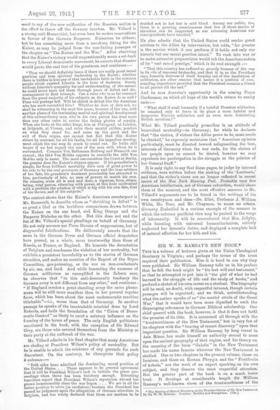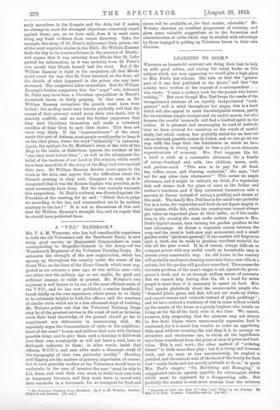SIR W. M. RAMSAY'S NEW BOOK.* THIS is a volume
of lectures given at the Union Theological Seminary in Virginia ; and perhaps the terms of the trust required their publication. Else it is hard to see why they were published. Sir William Ramsay tells us in his preface that he felt the book might be "his last will and testament," so that he attempted to put into it "time gist of what be had learned in the struggle of life and the study of books,' and prefixed a sketch of his own career as a student.. The biography will be read, no doubt, with respectful interest, though certain passages will be regretted ; and we think, notwithstanding what the author speaks of as" the mental strain of the Great War," that it would have been more dignified to omit the disparaging references to German Biblical scholarship. Our chief quarrel with the book, however, is that it does not fulfil the promise of its title. It is concerned all through with the "trustworthiness of the New Testament," but in very few of its chapters with the "bearing of recent discovery" upon that important question. Sir William Ramsay, by long travel in Asia Minor, has made himself an authority second to none upon the ancient geography of that region, and his theory on the meaning of the term "Galatia" in the New Testament has made his name famous wherever the New Testament is studied. One or two chapters in the present volume, those on Ieonium, and those on Roman Phrygia and the " Firstfruits of Achaia," are the work or an expert speaking on his own subject, and they deserve the most respectful attention. But the greater part of the book is on a much lower level. It develops at considerable length Sir William Ramsay's well-known views of the trustworthiness of the * The Rearing of Reacat Diecoverw os. the ren4eteeorthinese of tile New 2'astament, By Six W., M. Hammy. London: 'Hodder [Lull Stoughton. 11213.3 early narratives in the Gospels and the Acts, but it makes no attempt to meet the strongest objections commonly urged against them; nor, as we have said, does it in most cases bring any fresh evidence from recent discovery. Take, for example, the story of St. Peter's deliverance from prison, one of the most exquisite stories in the Bible. Sir William Ramsay finds the key to its trustworthiness in the mention of Rhoda ; and argues that it was certainly from Rhoda that St. Luke ' gained his information, as it was certainly from St. Peter's own mouth that Rhoda herself had the story. But if Sir William Ramsay is right in his conjecture, all that Rhoda could vouch for was that St. Peter knocked at the door ; all the details of what happened in the prison she may have misheard. The conjecture takes us nowhere. But Sir William Ramsay's further conjecture that the " angel " who delivered St. Peter may have been a Christian sympathizer in Herod's household leaves us fairly gasping. In that case, as Sir William Ramsay recognizes, the guards must have been bribed ; but as they must have known perfectly well that the escape of their prisoner would mean their own death, this is scarcely credible, and we need the further conjecture that they were Christians themselves and made a voluntary sacrifice of their lives to save their leader. This does not seem very likely. If the "trustworthiness" of the story needs this sort of defence, most people would prefer to keep it on the ideal plane, where the word " historicity " is unknown. Again, the apologia for St. Matthew's story of the visit of the Magi to the stable at Bethlehem ignores the incident of the "star that went before them " ; as well as the subsequent dis- belief of the brethren of our Lord in His mission, which would have been incredible if the story of the Magi had ever reached their ears. Sir William Ramsay devotes much space to the trials in the Acts, and argues that the difficulties about the Council meeting in chap. xxiii. disappear so soon as it is recognized that it was the Roman Captain who presided, as he must necessarily have done. But the text scarcely warrants this supposition. St. Paul's outburst was directed against the President of the meeting, for he maid: "Sittese thou to judge inc according to the law, and commandest me to be smitten contrary to the law? " It is not in discussions of this sort that Sir William Ramsay's strength lies, and we regret that he should have published them.



































 Previous page
Previous page